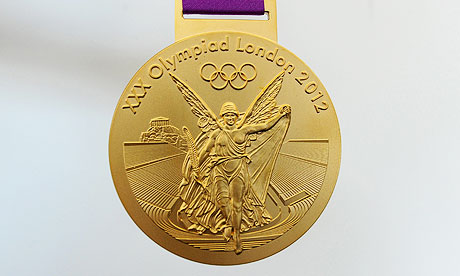Yay! The Summer Olympics are currently going on in London, and lots of happy athletes are taking home gold, silver, and bronze medals. I've spent far too much time in front of the TV or the computer, watching the coverage and knitting.
Right on the heels of the Summer Games is the start of the school year. My first official day back is Thursday, August 16, but if I want to take advantage of the District's "Buy Back" days (basically, extra days of work for which I am paid somewhat less than my actual salary) I have to be at two day-long meetings beginning on Tuesday, August 14. The kids come back to school on Monday, August 20, and the long grind to next June begins again.
The Olympics and the start of the school year got me thinking about the similarities between teachers and Olympic athletes. There are actually many similarities. Here's a list:
- Olympic athletes get up at ungodly hours to train. Teachers get up at ungodly hours to write lesson plans, prepare for the day, and grade papers.
- Olympic athletes give up a great many things--including personal lives--to focus on their sport. Teachers give up a great many things--including personal lives--to focus on their jobs.
- Olympic athletes do not make a great deal of money (unless they get lucrative endorsement contracts). Teachers do not make a great deal of money (unless they get lucrative administrative consultant contracts).
- Olympic athletes are scrutinized and scored on every little nuance of their performance on the playing field. Teachers are scrutinized and scored on every little nuance of their performance in the classroom.
- Olympic athletes spend many years and thousands of hours perfecting their sport. Teachers spend many years and thousands of hours perfecting their teaching.
- The best Olympic athletes learn to adapt quickly to changing circumstances (e.g., Michael Phelps' goggles breaking during the 2008 200 Butterfly Final) to minimize disrupting their performance. The best teachers learn to adapt quickly to changing circumstances (e.g., moving a classroom with 24 hours notice) to minimize disrupting the learning environment.
- Many Olympic athletes have a "kick": an extra bit of speed for the end of a race. Many teachers have a "kick": they use it to finish covering content in the two weeks between the end of Spring Break and the start of state-mandated testing.
- Olympic athletes make the difficult/impossible (e.g., a 2 1/2 inward with 2 1/2 twists off the 10-meter platform) look easy. Teachers make the difficult/impossible (e.g., Calculus) look easy.
- Armchair athletes around the world see an Olympic athlete perform and think, "Heck, I could do that." They can't, but they think they can. State legislators and the public see a teacher teaching and think, "Heck, I could do that." They can't, but they think they can.


No comments:
Post a Comment